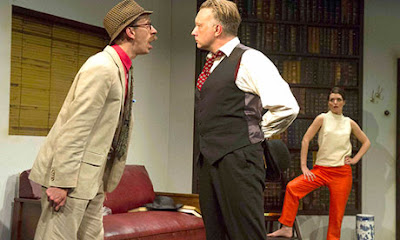DICK WHITTINGTON
at
the New Wolsey Theatre, Ipswich
26.11.13
Not
exactly an austerity panto, but this Dick Whittington is set in the
grey postwar world of the 1950s. Diego Pitarch's inspired design has
an illuminated Mansion House tube sign, and the tiled walls of the
London Underground. There's a red phone box stage right for Fairy
Bowbells, and manhole covers helpfully inscribed Foul Sewer London.
The
transformation from rat-infested underworld to gold-paved streets is
distinctly underwhelming, and only three characters have a costume
change for the walk-down.
But
no corners are cut in the performance; the ten actor-musicians give
their all in this, the 13th
rock'n'roll pantomime to hit the Wolsey stage.
It
never ceases to amaze – a dame at the drum-kit, a cat on the
trumpet, and full eight-piece backing band, plus vocals, for the big
solo numbers. All drawn from the same super-talented team of ten.
A
J Dean, a fresh-faced, winsome Dick, sporting a cheeky smile and the
obligatory spotted handkerchief, brings a very authentic rock'n'roll
style to the song and dance routines. His Alice is a very energetic
Nicola Hawkins; she has a wonderful way with the vocals, too, her
First Cut Is The Deepest a highlight amongst the 21 musical numbers.
“Hiya,
saucepots !” - it's Sarah the Cook, a man-hungry dame very much in
the old-fashioned mould: funny walks, mildly suggestive, easily
outraged, besotted with Steve in row B. A superb performance from
Sean Kingsley, who has impressive West End credentials. The other
comedy star is Tim Bonser as Billy Bungalow, with just the right
blend of pathos, physicality and sheer silliness [bubble pipe,
rat-a-pult …].
Wolsey
favourite Shirley Darroch is back as the good fairy. She has a
down-to-earth Cockney delivery, and certainly knows how to sell a
song - “Turn, turn”, a clever choice, is excellently delivered.
Jofre
Alsina makes a pompous Alderman, and Dan de Cruz, ducking and diving
as King Rat, leads an epidemic of rodents, including the Rat Pack of
Punks giving their Sex Pistols tribute. CiCi Howells, who'll play
Polly Peachum here next year, is a lovely, slinky Taffy the Cat.
The
playlist is eclectic: real 50s classics [Tutti Frutti] jostling with
Meatloaf, Mud and Bonnie Tyler. “Walking on Sunshine” works very
well, as does the high-octane encore “Tiger Feet”.
Peter
Rowe's script retains all the key elements of the traditional show –
some lovely rhyming couplets, too – but manages to bring
sophistication and freshness to it at the same time. Like the music,
not everything is retro – both Boris J and George O get a
name-check – and as Sarah points out, “it's not all about Dick!”.
And
there is an ominous sign that last year's gangnam might be this
year's twerking.
There's
a welcome sprinkling of the surreal – Derek the Fly, a few bars of
Cats, a tumbleweed moment – and the self-referential - “Seeing
stars ? Not in this panto, mate ...”. Even the sound effects –
often proudly flatulent – are the object of the Dame's frustrated
fury.
Not
so many local jokes this year, but every reference to Dick's home
town is met with a proud cheer from the packed Ipswich audience,
welcoming back this uniquely enjoyable blend of panto and popular
music.
production photograph: Mike Kwasniak
this piece first appeared on The Public Reviews



.jpg)














